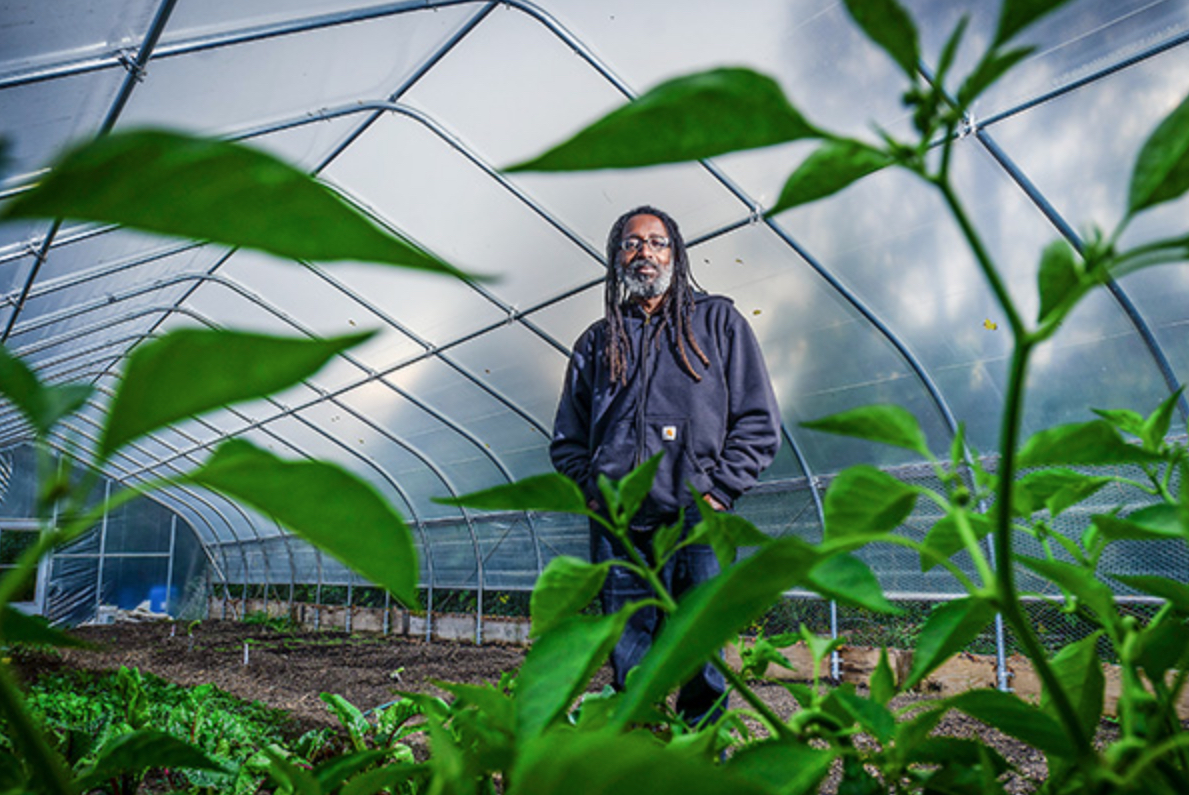Black Food Sovereignty in Detroit
Gallery

The Detroit Black Community Food Security Network (DBCFSN) is the inspiration behind D-Town Farm, located on the west side of Detroit.
DBCFSN is a community-based organization that focuses on addressing food security issues in Detroit, particularly within the black community. The network is committed to creating sustainable solutions that empower the community to have greater control over its food systems.
DBCFSN started small with its urban agriculture endeavors in 2006, starting on a quarter-acre plot of land on the eastside of Detroit. The farm, which Malik Kenyatta Yakini began in 2006 on a quarter-acre plot of property in a Detroit neighborhood, moved to River Rouge Park in 2008 and now occupies seven acres in the city.
Yakini’s passion for urban farming was sparked at the age of seven when he planted a garden in his Detroit backyard, initiating the start of this inspirational adventure. Yakini is the current head of the Detroit Food Policy Council in addition to serving as the leader of DBCFSN. Additionally, he served as the principal of Nsoroma Institute Public School Academy, an African-centered charter school in the Detroit area.
Encouraging healthy eating practices among Detroit’s youth is one of the DBCFSN’s objectives. The Food Warriors youth development program, which operates at Nsoroma, instructs young people on fitness and healthy living. A curriculum on food security is also ingrained in the school’s operations. Each week, at least one lesson must be tied to food security for all teachers. Instead of overloading some of the younger kids with a ton of textbook knowledge, their food security courses are more experiential and hands-on. Preparing and tasting various foods is an example of this. The school has long promoted healthy eating as part of its culture. Parents, teachers and children are not permitted to bring gum, sweets or soda pop into the facility at all. That has long been the rule.
Yakini gathered a group of forty individuals in February 2006, people he knew were either chefs, raw foodists, gardeners, or someone with some connection to food, to launch the DBCFSN. In 2011, Yakini left his role at Nsoroma Institute to lead DBCFSN, emphasizing the critical importance of food sovereignty.
Getting access to fresh, nutritious food has been a challenge for many Detroiters for decades. Many affordable neighborhood grocery stores departed the city, abandoning communities, making it difficult for families to find fresh, wholesome food nearby. Additionally, even though black people make up the great majority of Detroit’s population, the city’s black-owned grocery stores are limited, which depletes the neighborhood’s resources.
Black Americans have historically been disadvantaged, disempowered, and excluded from the mainstream economy in the city. In addition to promoting racial justice and fairness in the food system, the Detroit Black Community Food Security Network works to provide Detroiters with food security, justice and ownership over their own resources.
D-Town Farm is just one of the over 1,400 farms and gardens in Detroit. Together, urban farms represent a widely recognized movement known as Detroit’s “greening,” which includes the growing number of bike and pedestrian-friendly greenways that promote jogging and walking; tree plantings that transform empty, overgrown lots into parks and safe recreational areas; and riverfront development projects that have elevated the city’s once-polluted concrete stretch into a sustainable, visually beautiful, family-friendly attraction.
D-Town Farm distributes an abundance of fresh organic fruit and vegetables to local restaurants, farmers markets, and visitors during market days, which are typically Saturdays and Sundays throughout the peak of the growing season, from June through October.
Check out D-Town Farm, where they train new growers every year through volunteer opportunities on the weekends and official internships. The farm is open from March through November on Saturdays from 8:00 a.m. to noon and Sundays from 9:00 a.m. to noon.
